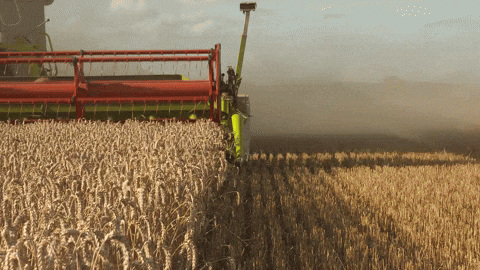Growing more with less is the name of the game for crop production. And the game is heating up as companies race to introduce more hybrid wheat to the U.S.
The rundown: Corteva is looking to take the lead by announcing a non-genetically modified hard red winter (HRW) wheat variety. HRW wheat is the most widely grown class in the U.S.
Corteva says the hybrid variety will boost yields by 10%, improve drought resistance, and outpace competitors when bringing these traits into commercial seed production.
Breaking barriers: Seed companies have been working on better genetics for decades to maintain production with the same—or even less—land. It’s proved far easier to modify corn yields, with those boosts far outpacing wheat. Now, Corteva wants to be a pioneer in reducing that discrepancy.
Soundbite: “Pioneer introduced hybrid corn in the 1920s, and since then our technology has helped achieve more than 600% increases in average yields. With our new, one-of-a-kind proprietary technology for wheat, we’re now similarly poised to bring the revolutionary benefits and yield potential of hybridization to yet another core crop.” — Sam Eathington, Corteva Chief Technology and Digital Officer
Neck and neck: Corteva’s announcement came months after the U.S. granted regulatory approval for a genetically modified wheat variety from Argentina-based Bioceres that has drought-resistant traits. But the seed needs more testing before it hits the commercial market.
Corteva plans to launch its hybrid HRW wheat in the North American market in 2027.
Short Corn Packs a Punch
Dynamite comes in small packages—which can be true with new seed technology. What’s...
Congress to EPA: What’s Your BEEF with Meat Packers?
The Environmental Protection Agency (EPA) is considering new regulations that take aim at meat and poultry processors.
And some members of Congress have a BEEF with the EPA’s proposals.
The proposed rules: In late January, the EPA released the details of its proposed “Clean Water Effluent Limitations Guidelines and Standards for the Meat and Poultry Products Point source category.”
Huh?
Basically, the EPA formally published its proposals to combat wastewater contaminants that come from slaughterhouses.
Okay… that makes more sense.
At the heart of the rules proposal is a concern from environmental groups about nitrogen and phosphorus pollutants that originate from slaughterhouses. In some cases, the wastewater goes directly into waterways. In other cases, the water goes to municipal wastewater treatment facilities.
But not everyone is on board with the EPA’s suggestions…
Congress responds: Last week, two U.S. representatives—Eric Burlison (MO) and Ron Estes (KS)—pushed back against the EPA and introduced the “Banning EPA’s Encroachment of Facilities (BEEF) Act.” If passed and signed by President Biden, the law would prohibit the EPA from finalizing, implementing, or enforcing the rule.
According to the lawmakers, the proposed rules place undue burden on small processors—costs that can be absorbed by larger companies.
Soundbite: “The… proposed regulation isn’t just an attack on family-run small businesses, it’s an attack on rural communities,” said Burlison. “These meat and poultry processors are the lifeblood of our communities. The BEEF Act… lets these hardworking Americans do what they do best, produce safe, affordable food for our families.”
University of Illinois Makes Big Mooves in Milk Production
Pump it up: Scientists led by Matt Wheeler at the University of Illinois Urbana-Champaign are...




